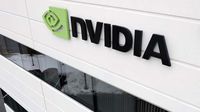Nvidia, the American chip giant, has announced that new restrictions on semiconductor exports to China will cost the company approximately $5.5 billion in exceptional charges for the first quarter of its fiscal year. This revelation came on April 15, 2025, when Nvidia disclosed the financial impact in a document filed with the U.S. Securities and Exchange Commission (SEC).
The restrictions, which were communicated to Nvidia by the Trump administration between April 7 and 11, 2025, require the company to obtain a license to export certain artificial intelligence (AI) chips to China and other countries. This decision is part of a broader strategy by the United States to control the export of advanced technologies, particularly those that could bolster China's military capabilities.
In response to the announcement, Nvidia's stock price fell by more than 5% in after-hours trading on the New York Stock Exchange, reflecting investor concerns over the potential financial ramifications of the new export controls.
Both the Biden and Trump administrations have imposed restrictions on the export of sophisticated processors to China, particularly those that facilitate the development of cutting-edge AI technologies and supercomputers. The latest export license requirement specifically pertains to Nvidia's H20 chips, which are designed for sale in China while adhering to the new restrictions. These H20 chips, while comparable to Nvidia's H100 and H200 AI chips used in the United States, are less powerful and slower.
Nvidia's SEC filing indicated that the results for the first quarter should include "up to approximately $5.5 billion in charges associated with H20 products (due to costs) of inventory, purchase commitments, and related reserves." The first quarter of Nvidia's fiscal year runs from February to April 2025.
The surge in demand for AI technologies, particularly driven by the success of ChatGPT, has propelled Nvidia into the top three of the largest market capitalizations. The company has reported annual revenues exceeding the symbolic threshold of $100 billion. However, the recent launch of DeepSeek, a generative AI interface from a Chinese startup, has raised alarms on Wall Street, as it was developed without Nvidia's flagship H100 microprocessor and relied solely on a limited number of less powerful chips.
During a quarterly earnings conference in February 2025, Nvidia's CEO Jensen Huang highlighted that revenues from China had plummeted by half compared to pre-export control levels. This decline underscores the growing concerns regarding competition from Chinese companies, which are rapidly advancing in the AI sector.
In a bid to counter these challenges, Nvidia announced on April 14, 2025, that it would manufacture chips for AI supercomputers entirely in the United States for the first time. This move aligns with the Trump administration's push to encourage American companies to relocate production domestically.
Nvidia has traditionally relied on subcontractors for semiconductor production, particularly in Asia, with significant manufacturing capabilities in Taiwan and China. However, the company has pledged that Taiwanese manufacturers such as TSMC, Foxconn, and Wistron will accelerate production in the United States and establish new specialized factories within the next year.
The White House issued a statement on April 14, 2025, praising Nvidia's commitment to domestic manufacturing, stating, "The relocation of these industries is a positive development for American workers, the American economy, and U.S. national security." This sentiment reflects the administration's broader strategy to bolster domestic production in critical sectors.
Furthermore, President Trump announced on April 13, 2025, that he would unveil new taxes on chips entering the United States within the week, signaling a potential shift in trade policy that could further impact the semiconductor industry.
As the geopolitical landscape continues to evolve, the implications of these export restrictions and domestic manufacturing initiatives will likely resonate throughout the tech industry and beyond. The balance between national security interests and the global competitiveness of American tech companies remains a pressing concern.


